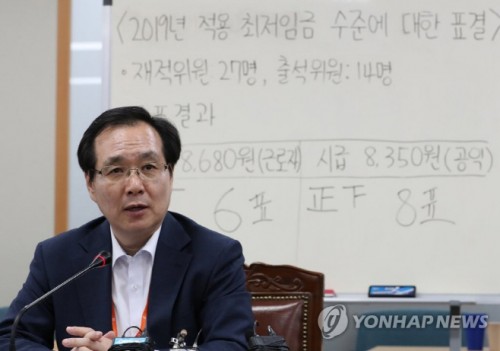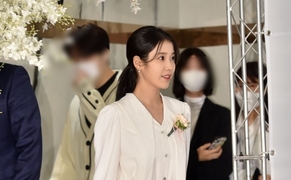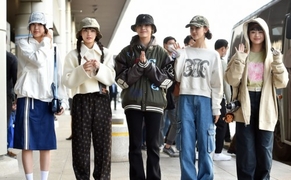 |
| Ryu Jang-soo, head of the Minimum Wage Commission, speaks during a briefing at the government complex in Sejong on June 14./ Source: Yonhap News |
By AsiaToday reporter Jang Min-seo
South Korea decided to raise the minimum wage for next year to 8,350 won ($7.37) per hour, up 10.9 percent from this year. It is a double-digit rate of increase for the second consecutive year, but it seems tough for the Moon Jae-in administration to achieve its goal of raising the minimum wage to 10,000 won by 2020. Besides, the latest decision is expected to spark backlash from both labor and business communities as they remain unsatisfied.
According to the Minimum Wage Commission on Sunday, the minimum wage for next year has been set at 8,350 won per hour, at a 19-hour-long meeting of minimum wage that ended on Saturday at the government complex in Sejong.
This is an increase of 10.9 percent from this year's 7,530 won. Monthly salary at the minimum wage - based on a 40-hour workweek - will be 1,745,150 won.
Among 27 members of the commission, five members representing the labor community and nine members from the general public side attended the meeting to vote for the minimum wage for next year. Nine representing the management community boycotted the meeting.
Minimum wage proposals from the Workers' Commissioner (8,680 won) and Public Commissioner (8,350 won) were put up for a vote. The latter earned eight votes and was chosen as the minimum wage for next year.
While the minimum wage will continue to rise by double digits for the second consecutive year, the Moon Jae-in administration's goal of raising the minimum wage to 10,000 won per hour by 2020 is expected to be delayed. Assuming that increase rates will be same for 2019 and 2020, at least a 15.2 percent hike is needed to achieve the goal.
Experts are speculating that the commission is controlling the level of the hike. There has been criticism that small business owners are suffering from increased labor costs due to soaring minimum wage. Besides, Strategy and Finance Minister Kim Dong-yeon said on Thursday, "The idea of raising the minimum wage needs to be done flexibly by fully analyzing its impact on employment and finance, as well as the difficulties and acceptance of the market and employers." Ryu Jang-soo, head of Minimum Wage Commission, said in a press conference after the meeting, "The country's employment situation was reflected in the commission's discussions. We made such decision after considering the nation's economy, employment situation and low-wage workers' wage hike."
Although the minimum wage for next year has been set, opposition from both labor and business communities is likely to continue. The labor side said the result didn't give hope to low-wage workers, while those from business circles said wage hikes will further pressure small business owners. The Korea Federation of Micro Enterprise said the decision of the Minimum Wage Committee was made in the "overturned playground" and that it was an "unilateral decision".
Ryu said the commission understands the difficulties of small-business owners and low-wage workers and will submit to the government proposals to support them.
On the other hand, the Ministry of Employment and Labor, which oversees the commission, is set to formally announce the minimum wage for 2018 on Aug. 5. It will officially take effect form Jan. 1, 2019.
#minimum wage hike #labor #employers #Moon Jae-in
Copyright by Asiatoday
Most Read
-
1
-
2
-
3
-
4
-
5
-
6
-
7





















